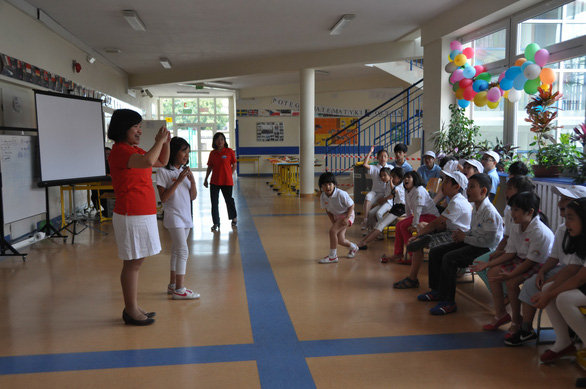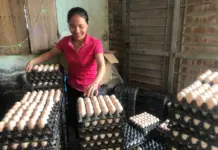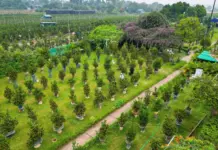‘ 20 most influential Vietnamese women.
However, she has led a mostly silent journey of nurturing and spreading the love for mother tongue among overseas Vietnamese communities for nearly two decades.
Mother’s worry
“I lived for 17 years in Russia with an intention to settle down in mind,” Anh recalled.
“As a mother living far from my homeland, I was afraid that my children would grow up not knowing Vietnamese or unable to talk about their feelings with us in the pure, rich Vietnamese language.
“I was even reluctant to send them to a local kindergarten as I wanted them to speak their mother tongue well first.”
She brought up her kids in a Vietnamese-centric environment by talking, singing lullabies, and reading stories in Vietnamese.
“I even wrote them poems,” said Anh.
“It was the time when I wrote many poems for children which were inspired by Vietnamese folklore.
“As years have passed, I have noticed that overseas Vietnamese children are interested in those kinds of poems because they are fun, rhythmic and memorable,” she added.
Having experimented with different approaches for teaching Vietnamese, Anh was inspired to develop her own method based on creating momentum via interactive activities.
According to Anh, children are driven by curiosity when learning Vietnamese.
It is also essential to build a small community in which they feel belonging and happy.
Even when coming back to Vietnam, Anh kept thinking about returning to Russia to do something that spreads Vietnamese.
It was a destiny that she was connected with Le Xuan Lam, principal of a Vietnamese-teaching school named Lac Long Quan in Warsaw, Poland, who shared the common love for their mother tongue.
In 2012, Anh was invited to Poland to train the school’s teachers in her method of teaching Vietnamese.
Vietnamese language camps
There are various challenges posed to teachers of Vietnamese overseas as most of them are volunteers, holding no certificate in teaching the language.
They do the job simply because of their love for children and their mother tongue.
That year, Anh discussed with Lam the idea of holding a Vietnamese-learning summer camp named ‘Play with Vietnamese’ with a curriculum she had designed.
The move was to set up a Vietnamese-speaking community for its participants, the first step being to help children get interested in the language naturally.
“Only 30 children signed up at first,” Anh recounted.
“However, it was a huge surprise when some 80 people, adults included, showed up at the camp opening day.
“We invited more than 20 participants, aged from 15 to 17, to be volunteers in charge of younger ones.”
Many activities took place including interactive theater, games, story-telling contests, and talks with artists.
Although participants’ Vietnamese-speaking levels were not the same, they helped one another to speak up and deliver their ideas completely in Vietnamese.
Anh said parents were moved seeing their children excitedly using Vietnamese songs with their friends.
After the summer camp, group discussions still continued, creating a moving moment among the second Vietnamese generation in Poland.
The question ‘Why do I need to learn Vietnamese?’ they kept asking their parents was then answered, according to the educator.
The first camp’s success helped ‘Play with Vietnamese’ attract sponsorships from organizations and individuals of the local Vietnamese community to sustain its activities in Poland.
|
|
| Overseas Vietnamese children learn how to spell Vietnamese words at the ‘Play with Vietnamese’ summer camp in Warsaw, Poland. Photo courtesy of Nguyen Thuy Anh |
In 2017, Anh started a brand-new project called ‘Stuttgart School of Wizardry’ in Stuttgart, Germany.
It is actually a Vietnamese language fall camp held during the fall break and Halloween with learning lessons integrated into role-playing adventure games.
Open to all family members, the camp created and nurtured the bonding not only among campers but also with the Vietnamese culture and language.
“There were craft workshops in which children learned how to make hand-made toys and stuffed animals from Vietnamese-speaking teachers,” Anh said.
“By listening to instructions and collaborating with each other, they absorbed Vietnamese words naturally and easily.
“It was how we created a proactive learning environment for children.”
After three consecutive years of organizing the Vietnamese language camp in Stuttgart, Anh planned to duplicate the model in Russia where she had lived for 17 years.
However, the COVID-19 pandemic postponed it indefinitely.
‘Hello Vietnamese!’ book collection
As the pandemic hinders in-person meetings, Anh spends time writing books.
Her work – a collection of six books named ‘Hello Vietnamese!’ – meets all standards set by Vietnam’s Ministry of Education and Training on teaching the language overseas.
“Vietnamese children living in foreign countries approach Vietnamese as their second language,” she said.
“Meanwhile, most of their parents and grandparents can speak Vietnamese fluently.”
Therefore, Anh always tries to call for the participation of adults in all activities to naturally introduce children to a Vietnamese-speaking community.
As Anh sees it, overseas Vietnamese children start loving and talking about their motherland emotionally and proudly after participating in Vietnamese language camps.
“There is a participant who hangs a big S resembling the map of Vietnam on her bedroom wall after returning from a camp,” she recalled.
“On it, she sticks postcards of locations she and her families visited in Vietnam.
“Next to it, she adds some other dots for Hoang Sa (Paracel) and Truong Sa (Spratly) archipelagoes.”
Like us on Facebook or follow us on Twitter to get the latest news about Vietnam!





